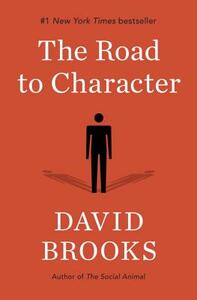Take a photo of a barcode or cover
I find it interesting that many of my friends are David Brooks haters. Reading him makes me wonder if they actually read him, or just think they know who he is and what he stands for. While I don't agree with everything he says, there are few people that I do. This is a lovely book full of compassion, wisdom, and insights. He starts with thinking about the traits you would list on your resume versus those that would be in your eulogy. Through exploration of individuals, he delves in to character, morality, and what it means to be a person of substance. No recipe, just good thinking. His thoughts on what it means to be a moderate, and the traits of a person walking with another through their personal health misery, stand for me as a sample of beautifully written moments that I will not soon forget
I like the premise of this book. I like the idea of how the author used real people and by telling their life stories, showcased various character traits. I didn't always follow what the author was trying to show, but I liked the short stories within the book and learning about the various individuals.
I really liked the intro to the book and am rating it based on the nuggets that can be found there. Because I attended book club for this book immediately following the Christmas break I didn't have as much time to dedicate to reading it and/or finishing it. I got about half way through the book. I skipped the second half and read a good portion of the conclusion. I appreciated the good discussion we had about this book. We spent more time discussion this book than many of our other choices. Unfortunately the book didn't captivate me enough to push me to finish it after book club.
I really liked the intro to the book and am rating it based on the nuggets that can be found there. Because I attended book club for this book immediately following the Christmas break I didn't have as much time to dedicate to reading it and/or finishing it. I got about half way through the book. I skipped the second half and read a good portion of the conclusion. I appreciated the good discussion we had about this book. We spent more time discussion this book than many of our other choices. Unfortunately the book didn't captivate me enough to push me to finish it after book club.
Everyone should read this book! One of the best books on character I’ve ever read. Brooks attacks in a helpful way how we currently see life. The stories he uses as examples of character are excellent. I learned a lot about important historical figures and at the same time resonated with his understanding of character.
First the disclaimer, I won this book in Goodreads Firsts. I thought this book sounded interesting, this is not normally something that I would pick off the shelf but I thought, what the hell... It was an educational read on several different character studies, looking at their lives and what caused them to develop their specific character traits. Each of the individuals studied would be considered a high character individual and it was very interesting to me to learn of these historical figures in context of their lives, not just the historical events which they are famous for. I found the summary at the end of the book interesting even if not enlightening.
I loved the idea of this book more than the execution of it. Brooks explores virtues from previous generations that have faded in current society, and does so by having each chapter tell the story of a person in history who exemplified each virtue. The entire journey is framed by Rabbi Joseph Soloveitchik's framework of Adam 1 and Adam 2 humanity. Adam 1 is concerned with the outer world: achievement, job, doing. Adam 2 is concerned with the inner world: values, character, morality. I agree with the general thesis: we all would do better as individuals and society to attend more to our inner world and to questions of what is good and right, rather than what is practical and expedient. We would do well to listen to community and tradition for perspectives on morality, rather than make it solely an individual pursuit.
However, there is a "these darn Millenials" and "you kids get off my lawn" flavor that peaks through a little too often, a whiff of condescension that hurts his excellent story telling and helpful insights. The first and the last chapters do an excellent job of saying both/and rather than either/or. But in the heart of the book, it loses that balance and emphasizes societal norms to the extreme over individual thought. More acknowledgment of the dangers of social structures leading to injustice of minorities would help. I think Brooks (except in the first and last chapters) swings the pendulum too far back.
However, there is a "these darn Millenials" and "you kids get off my lawn" flavor that peaks through a little too often, a whiff of condescension that hurts his excellent story telling and helpful insights. The first and the last chapters do an excellent job of saying both/and rather than either/or. But in the heart of the book, it loses that balance and emphasizes societal norms to the extreme over individual thought. More acknowledgment of the dangers of social structures leading to injustice of minorities would help. I think Brooks (except in the first and last chapters) swings the pendulum too far back.
Disappointed in this book. Good stories and a helpful reflection on what different people thought character was and how they developed it. But this book is missing the wisdom of Shermer’s the Moral Arc and Harris’ The Moral Landscape, the clearer view of Pinker’s Enlightenment Now or Taleb’s Skin in the Game. It goes for the blue duty and cold dust-bowl Puritan morality, and lacks the refreshing real-life character developed by the much more helpful Brene Brown. The book isn’t set up to simply teach you the what or how if character, but the stories don’t help as much as it seems they should. I’m fascinated with Character and character formation and I didn’t get the meat I expected. Maybe when I re-read this to pull quotes and break down more of why I think his thoughts are murky I’ll rethink my position but I won’t be recommending this one.
informative
reflective
I read this upon recommendation of my parish priest, who mentioned it in a sermon. Brooks provides a fascinating way to think about the "eulogy virtues" and explores them in a variety of people from the recent past to ancient times, gay, straight, male, female. I'd actually not mind having this in hard copy form in my permanent collection, because some of these essays I'd like to return to.




